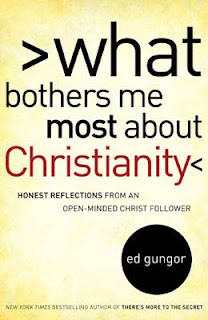 Some folks think the notion of a superintelligent, Creator God is essentially and irredeemably irrational.
Some folks think the notion of a superintelligent, Creator God is essentially and irredeemably irrational.Because they see no proof for God’s existence, this group believes that science has consistently proven there is no God. They contend that people who believe in God are superstitious, obscurantist, naïve, and in denial about the advances of science. At the very least, atheists see faith in God as infantile – a childish notion that should have disappeared as soon as a person was capable of evidence-based thinking.
Just because something is shrouded in mystery doesn’t mean it’s stupid to believe it. In fact, it’s natural and rational to believe something based on a preponderance of evidence. This natural faith is the result of a simple curiosity that examines the evidence and makes hypotheses about possibilities. This is the same sort of faith that makes a scientist explore the mysteries found in the world of nature.
The order and complexity of the universe reasonably points to a creator or a transcendent being. But since no one caught the Creator in the act of creating, the skeptic can propose the notion that the whole concept of God is a hoax, and that would be fair as far as the rules of skepticism are concerned. Even though some people claim they know God, such claims don’t prove he exists. However, to suggest (as writers like Richard Dawkins and Christopher Hitchens do) that openness to the reality of God is evidence that one is deranged, deluded, and deceived is unfair by anyone’s rules. Belief in God’s existence is not irrational.
Let me point out that simple belief in God does not constitute a faith that has strong conviction. It isn’t settled. Such belief is restless and longs for more information and validation. This general belief isn’t the deep faith that Scripture identifies as being “sure of what we hope for and certain of what we do not see.” Belief in the notion of God is only the first step down the trail to having a transformational, personal encounter with God. This type of faith is perfectly reasonable.
However, when it comes to the deeper faith described in Scripture, the critics are right. It isn’t rational at all. At some point, faith calls for a leap past logic and reasoning. Many things have been proven through the scientific method, which rigorously studies the evidence and refuses to allow hypotheses to become beliefs until something is unquestionably demonstrated. In contrast, even though there are clues that point to the existence of God, those God clues will never prove God’s existence.
As we suggested in Chapter 1, a person investigating a belief in God will bump into one clue after another, until somewhere along the way a choice emerges. This is faith of another ilk. This kind radically leaps over the lack of empirical proof and believes what one cannot possibly prove. This is unreasonable faith, and we should call it that because it violates the rules of reason. Its roots are metaphysical; it is the stuff of the supernatural. Unreasonable faith isn’t just the result of human effort; it is the coworking of an open heart and a sprinkling of divine grace.
- Ed Gungor, What Bothers Me Most about Christianity: Honest Reflections from an Open-Minded Christ Follower, pp. 23-27.
Live free! Live in Daddy's affectionate love!






